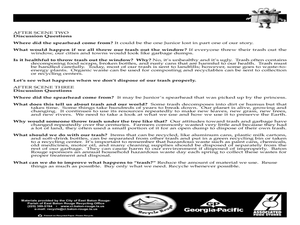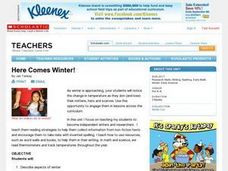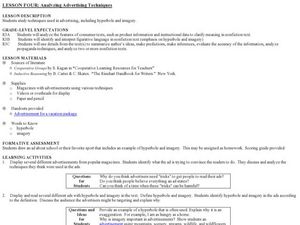Curated OER
Health Education: Stress
Fourth graders tackle stress. In this personal health lesson plan, 4th graders predict physical and emotional reactions to stressful situations.
Curated OER
It's Just a Barn
Investigate Pennsylvania Barns. Have your class consider the elements common to Pennsylvanian barns and why they are significant to the food production process. They write summaries of Frederick Watts and his impact on agriculture.
Curated OER
Fitting Trash into Yesterday: A Fifth Grade Activity
Fifth graders explore the concept of waste management. In this recycling activity, 5th graders discover the history of waste management and discuss how the U.S. should respond to the issue of ever-increasing waste.
Curated OER
Keeping Warm When it is Cold: How does a polar bear keep warm?
Students make a model of a polar bear and discuss why fur/skin color is important. They also perform a simple experiment using black and white socks to determine how color affects temperature.
Curated OER
Here Comes Winter!
Learners investigate winter behaviors in animals. They describe winter and write about the characteristics of the season by drawing and labeling a winter picture. Students then conduct research on a chosen animal and create a chart. ...
Curated OER
Health Education: Germs
Fourth graders take part in a germ simulation activity. In this personal health lesson plan, 4th graders summarize methods for preventing the spread of germs that cause communicable diseases.
Curated OER
To a Place Like No Other (Galapagos Islands)
Students research and collect information on the Galapagos Islands. In this Galapagos Islands lesson, students find information for a jeopardy game, a first person account and a geological discovery related to the Galapagos Islands.
Curated OER
Chameleons Are Cool!
Have your learners review what they know about camouflage using this lesson. Learners fill out a graphic organizer listing what they know or have questions about. This could be enhanced with the addition of a writing assignment in which...
Alabama Learning Exchange
J. Alfred Hyperbolizes
Mermaids will sing to your class members as they engage in an activity related to T.S. Eliot's famous dramatic interior monologue. After engaging in a socratic seminar about literary devices in the poem, individuals choose one...
Curated OER
Self-Monitoring Strategies and Vocabulary Games
Teachers model self-monitering strategies for their high schoolers. They participate in games and artwork that help them increase their vocabulary. They also complete a crossword puzzle.
Alabama Learning Exchange
Attitude Determines Altitude
A fabulous lesson which combines mathematics with space science. Middle schoolers work in cooperative groups in order to research early astronauts and their accomplishments. They look at a variety of rocket and space shuttle designs, and...
Curated OER
"O Captain! My Captain!"
Who was Walt Whitman, and what link does he have to president Abraham Lincoln? After Lincoln's assassination, Whitman wrote "O Captain! My Captain!" This poem and "When Lilacs Last in the Dooryard Bloom'd" are the focus of...
Curated OER
Can You Build a Better Mousetrap?
Students use a variety of linked sites to research information about student inventions and contests that are available for them. They research an invention they would like to see become available. They communicate their results to their...
Curated OER
Primary Sources and Protagonists: A Native American Literature Unit
Introduce your middle schoolers to the lives of past Native Americans. First, learners work together to put photographs in a sequence. Then, using their sequence, they create stories to share with the whole class. No matter how old your...
Curated OER
Who Invented English Anyway?
In these English lesson plans, learners use video, the Internet and non-fiction essays to research the history of the English language. They write a short research paper and design a PowerPoint presentation showcasing their findings.
Curated OER
Self-Monitoring Strategies and Vocabulary Games
Middle and high schoolers identify how to discover a word's meaning by exploring context clues and any pictures, diagrams, photographs, and charts that might be included. They continue this process with other examples and locate one on...
Curated OER
Christopher Columbus: The Man, the Myth, the Legend
Learn more about maps by examining Christopher Columbus's voyage to the New World. Kindergartners will learn about basic map skills and how to identify the compass rose, oceans, and land masses. They will also discover the purpose of...
Curated OER
Juvenile Delinquency
Ninth graders analyze and interpret historical research by examining, analyzing, and forming opinions regarding primary resources. They compare/contrast social conflict, its causes and effects, in regards to continuity and change over time.
Curated OER
Where Is Saturn in the Solar System? Where Am I in the Solar System?
Students discover the planets and their location in the solar system. They complete a KWL chart on Saturn and discuss. They complete the lesson with a writing activity.
Curated OER
Identifying Clouds
Young scholars work in groups to research and prepare a report on cloud types. They present their findings to the class and take a group quiz competing for points. Students go outside and determine which type of clouds are visible on...
Curated OER
Analyzing Advertising Techniques
Students study hyperbole and imagery in advertising. In this advertising techniques lesson, students identify hyperbole and imagery in print advertisements.
Curated OER
Geometry and Quilting
Fourth graders combine geometry and language arts skills while examining quilt-making. After identifying the geometric shapes contained in quilts, they write stories to encompass the quilt border. Students conclude by creating and...
Curated OER
Reef Attack
Students identify the locations of coral reefs. In this oceanography lesson, students use the Coral Reefs website to locate the coral reefs on a world map and discuss ways to help protect the coral reefs.
Curated OER
Developing Open-Ended Questions
Pupils work in groups of two to develop questions and sample answers that are relevant, accurate and use higher level of thinking skills about a literary unit. Students present their questions and answers to the class as a review of the...






















